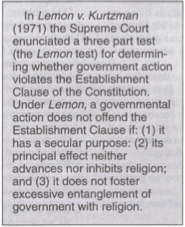Lemon test challenged
The Catholic League has joined the American Center for Law and Justice in filing a friend of the court brief in the Supreme Court supporting the creation of a special school district to serve the needs of handicapped children in the village of Kiryas Joel, New York.
In Board of Education v. Grumet, (seep. 14 of Jan.-Feb. 1994 Catalyst for background information) the Court will decide whether creation of the special district is a permissible accommodation of religion or whether such action violates the establishment clause of the First Amendment.
This case will also provide the Court with another opportunity to review the controversial Lemon test (see box) which the Court has
New York’s highest court ruled that Chapter 748, the state law creating the district, violated the second prong of the Lemon test because by giving in to “the demands of a religious community whose separatist tenets create a tension between the needs of its handicapped children and the need to adhere to certain religious practices” it had the “primary effect” of advancing religion.
The League’s brief argues that even under the Lemon test, the New York law in question is constitutional. Chapter 748 has the secular purpose of resolving a controversy over providing suitable special educational services for the children residing in Kiryas Joel; the effect of the law, granting the citizens of a validly incorporated municipality the authority to operate a secular public school system for the benefit of their children, neither advances nor inhibits religion; and, finally, the law does not foster excessive entanglement of government and religion.
The League’s brief then calls on the Court to abandon the second prong of the Lemon test because its results are inconsistent with the principles of free exercise and accommodation. In its place, the brief urges adoption of the coercion test and direct benefits test for deciding establishment clause cases.
The coercion test bars use of governmental compulsion or force to cause people to adopt religious beliefs or to participate in religious rituals.
Under the direct benefits test there would be no violation of the establishment clause if the government benefit flows to individuals or secular recipients who make a free choice to pass the benefit to a religious institution, or the funding comes from a governmental program with a secular governmental purpose, and the religious organizations which enjoy the benefit are not the sole recipients of governmental money.
Using this analysis, the creation of a special education district whose boundaries are contiguous with a pre-existing government municipality does not violate the establishment clause. Chapter 748 involves no government coercion and provides no direct aid or subsidy to any religious institution. Chapter 748 represents a permissible accommodation which provides a means whereby Satmerer children can receive the educational services to which they are entitled without being forced to sacrifice their religious traditions.
Oral arguments in this case are scheduled in March and a decision is expected in late spring.






